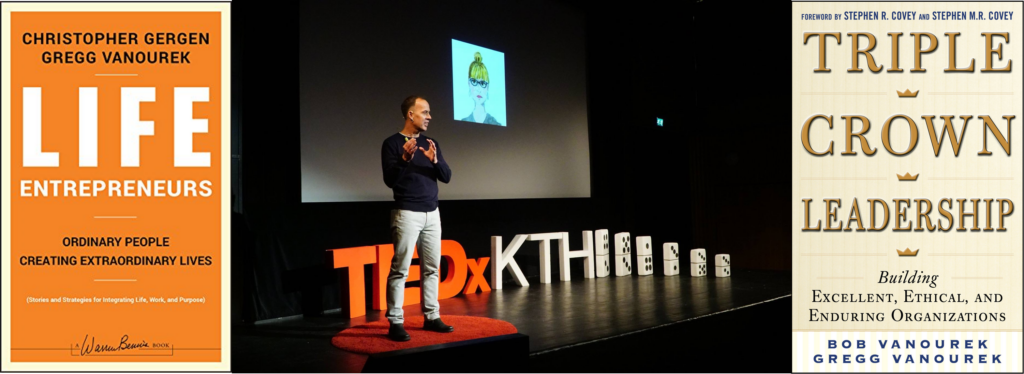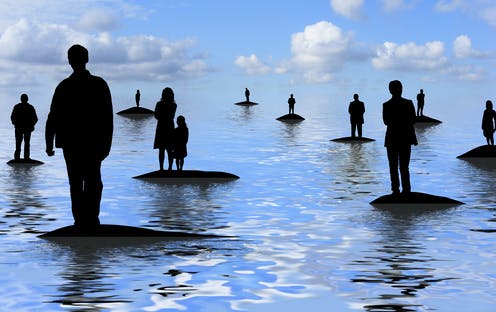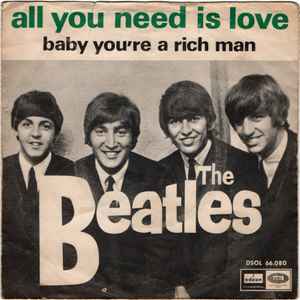Work is a big part of our lives. It’s essential to our income and security, and it can be a source of meaning and satisfaction. But there are dangers with having our identity too wrapped up in our work.
What happens if we’re laid off? Or in-between jobs? No longer able to do that kind of work? Retired? We’re vulnerable to an identity crisis and a downward spiral when the work that animates our identity disappears or changes.
“Avoid having your ego so close to your position that when your position falls, your ego goes with it.”
-Colin Powell, U.S. Army officer, statesman, and diplomat
For sure, there are many different types of workers out there: nine to fivers working for the weekend, side hustlers, part-timers, hybrid professionals, unemployed, underemployed, and more. Some like or love what they do. Others despise or endure it.
Some toil away in a workaholic organizational culture. Others are trying to live up to parental expectations. Some are trapped in golden handcuffs. Others can’t stop ruminating about work situations and scenarios.
The Traps of Overidentification with Work
There’s nothing wrong with working hard. Or with loving or liking what we do. Or with identifying with our work.
The problem comes when we identify too much with our work, losing other important aspects of ourselves and our lives in the process.
“You are not your job, you’re not how much money you have in the bank. You are not the car you drive.
You’re not the contents of your wallet. You are not your f**king khakis.”
-Chuck Palahniuk, Fight Club
Problems come when we bury ourselves in busyness and overwork—when we glorify being busy and can’t slow down and shut if off (or can’t feel good when we’re not working). According to a meta-analysis of 89 studies, workaholism is related to lower physical and mental health and lower job, family, and life satisfaction. Sometimes we use overwork to avoid dealing with difficulties, disconnections, rejections, or wounds.
We get into trouble when work is all about trying to please or impress others. When we reject who we really are—abandoning our true nature and avoiding our calling.
Problems pop up when we bury ourselves in someone else’s priorities so much so that we never get to our own.
It’s nice when we get recognition, praise, or even prestige from our work, but it’s dangerous when we become dependent on those, addicted to our next hit.
It’s a problem if we feel terrible when work is going poorly, clouding everything in disappointment.
It becomes a trap when our relationship with work becomes an obsession in which we’re constantly striving and can’t switch it off—when we’re never satisfied with things as they are.
It’s trouble when our attachment to work disconnects us from meaningful relationships—from the people we love and who need us.
“…the work I’ve put between us, you know it doesn’t keep me warm.”
-Don Henley in “The Heart of the Matter”
It’s limiting when our current work keeps us from moving forward and trying new things, because we feel safer in the current iteration of our work and wary of venturing forth. So we avoid the uncertainty and awkwardness of the in-between periods of our lives—the ones that tend to lead to the biggest breakthroughs in growth and fulfillment after we ride out the storms of fear and doubt and stare down the unknown.
The problem is when our identity is wrapped up too much in our work, with too much emotional investment (and time). It leads to stress, anxiety, burnout, or depression—and a sense of emptiness, disappointment, or regret.
Who are we? Are we only our title? Only the person who gains income or accolades? Yes, we are those, and we’re wise if we’re intentional as possible about infusing those activities with as much heart and soul and fun as we can. It’s great if we can integrate our life and work into a cohesive whole that suits us. It’s powerful if we can integrate our values, passions, and authenticity across all the domains of our lives, bridging them with an overarching sense of purpose.
“A happy life is one which is in accordance with its own nature.”
-Seneca, Roman Stoic philosopher

But aren’t we also husbands or wives, fathers or mothers, sons or daughters, friends and neighbors, lovers and dreamers, community members, citizens, and humans bound together on spaceship Earth?
What to Do If Your Identity Is Wrapped Up in Work
What to do when we’re identifying too much with our work and not honoring other important areas of our lives?
Return to what’s important: who and what do we love? What do we long for? What are we missing in our life?
Do we have enough vitality, connection, and contribution in our lives, as Jonathan Fields recommends? Do we have a strong sense of our “core identity,” and are we living with “authentic integrity” (integration of all aspects of our lives in a way that coheres with our true nature)?
We all get off-kilter sometimes. We need to cut ourselves some slack. But we also need to stop lying to ourselves. We must take our lives back when we’ve given them away. We must honor the fullness of our nature and the marvelous range and depth of our lives, both in and out of the work we do. If we do, we can learn to be well regardless of the events and circumstances of the day, grounded in a deeper presence and appreciation for all that we’ve been given.
Reflection Questions
- Is your identity wrapped up in work?
- What important areas of your life are you neglecting?
- What will you do start doing to make yourself whole again?
Tools for You
- Traps Test (Common Traps of Living) to help you identify what’s getting in the way of your happiness and quality of life.
- Quality of Life Assessment so you can discover your strongest areas and the areas that need work, then act accordingly.
- Crafting Your Life & Work (my signature online course) to help you design your next chapter and create a life you love.
Related Articles
- Time to Check the Path You’re On?
- The 7 Most Common Career Regrets (And What They Tell Us)
- Burnout and the Great Resignation
- Beware the Disease of More
- Golden Handcuffs—Stuck in a Job You Don’t Like?
- Are You Trapped by Success?
- The Power of Relationships in Our Lives
- The Conformity Trap
- The Mental Prisons We Build for Ourselves
- Do You Have Margin in Your Life?
- The Trap of Deferring Dreams and Postponing Happiness
- The Trap of Caring Too Much about What Other People Think
- The Comparison Trap
- Are You Playing the Long Game?
Postscript: Inspirations on Life, Work, and Identity
- “Know, first, who you are, and then adorn yourself accordingly.” -Epictetus
- “‘Can I be comfortable in my own skin regardless of what’s going on around me?’ And that to me is the definition of true success.” -Peter Crone
- “People who can tolerate the painful discrepancies of the between-identities period, which reflect underlying ambivalence about letting go of the old or embracing the new, end up in a better position to make informed choices. With the benefit of time between selves, we are more likely to make the deep change necessary to discover satisfying lives and work and to eventually restore a sense of community to our lives.” -Herminia Ibarra
+++++++++++++++++
Gregg Vanourek is a writer, teacher, and TEDx speaker on personal development and leadership. He is co-author of three books, including LIFE Entrepreneurs: Ordinary People Creating Extraordinary Lives (a manifesto for living with purpose and passion) and Triple Crown Leadership: Building Excellent, Ethical, and Enduring Organizations (a winner of the International Book Awards). He has worked for market-leading ventures and given talks or workshops in 8 countries. Check out his Crafting Your Life & Work online course or get his monthly newsletter. If you found value in this article, please forward it to a friend. Every little bit helps!













